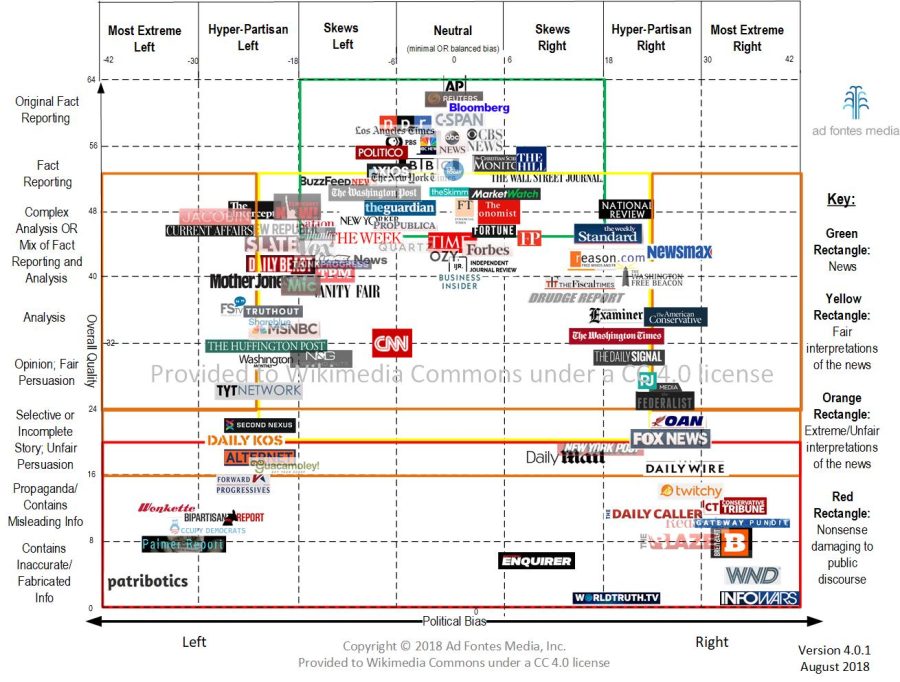The self-destructive tendencies of journalism
Photo provided by: Wikimedia Commons
News media biases reach across the political spectrum and vary greatly in intensity and typology.
December 6, 2021
Journalism in the U.S. is under attack. Never more in our nation’s past has the legitimacy of news been questioned to such a degree. With allegations of “Fake news” being thrown around left and right, it’s easier than ever to question every opinion that contradicts your own. It creates an us versus them mindset that pits wealthy versus poor, left versus right, in a pursuit for all sides to find some form of affirmation towards their views. This mindset is only furthered by the extreme headlines that seem to represent 95% of news.
Yes, journalism is under attack, but not by those you may think. It’s true that politicians are attacking news sources who go against them, and it’s also true that all sides of the political spectrum are quick to condemn news sources in their entirety for going against even one aspect of their views. However the majority of the battle against journalism is fought by journalists themselves, their weapons being fear mongering and misinformation. In reality, this is a war with no opposing sides and viewpoints, just a lot of people yelling.
How did we get here? I think it’s important to ask how the current state of journalism in the U.S. became what it is. Although this seems like a uniquely modern problem, the deterialization of the validity of news has been eating at the U.S. for quite some time. An easy place in time to point to as the beginning of this disease would be the spread of yellow journalism in the 19th century. During this time leading up to the Spanish-American War, it was found that by manufacturing extreme and exaggerated headlines, the sale of newspapers would increase. The target of these misleading headlines was almost universally Spain, who were fighting to maintain control of Cuba at the time. The only stakes the U.S. really had in this conflict was the fear of American owned sugar cane plantations being harmed in the struggle; however, the press was able to make this an issue of national pride for American Citizens. The natural climax to this occurred upon the explosion of U.S. naval ship “The Main.” This horrific explosion killed all those on board. This tragedy was then exploited by news sources that claimed that the explosion was caused by a water mine planted by Spain. The public outcry that followed was enough to push the U.S. to declare war on Spain, despite the fact that a later investigation found that the explosion was caused internally.
More often people tend to focus on the politics of journalism. When looking at all news sources, certain trends quickly become transparent. Both news media on the left and right will complain about the same things: fake news and censorship. Arguably two sides of the same coin. The apparent output of falsehoods and the censoring of the truth. But then who’s right? Well, both, and neither.
I think we often think of this attack on journalism as something harmful to news sources, but this isn’t really the truth. Arguably one of the main targets of these accusations of misinformation is the most popular news network, FOX. Despite this, FOX’s profits increased to $567 million. No matter what you believe or who you trust, you’ll find that there is a group of like minded individuals who share the same values. Often these groups are able to find representation in at least one mainstream news source. These hubs of opinion then will generally work to create rage against the other side and to further radicalize their audience so that they are more likely to continue placing their trust in that source. This process, also called fear mongering, is especially prevalent today. Take for example topics such as the war on Christmas, the war on masculinity and critical race theory. These issues have no real basis in fact, but are still quite attention grabbing. Whether any given person agrees or disagrees with each of these topics, they most likely have a strong opinion towards them. Those strong opinions will lead them towards people and news sites that match those views, furthering their own beliefs and hate for the other side along the way.
I’ve largely addressed these problems in the context of network news media thus far, however those sites exclude a large group of people, mainly younger people. If you were to talk with politically minded people from younger generations, you’d likely find that they prefer social media sites for news instead of the broadcasted news hubs that older generations prefer. They’ve effectively swapped MSNBC, CNN and FOX for Twitter, YouTube and TikTok. The spread of misinformation and fear mongering is arguably a bigger problem on these networks simply due to the fact that they are producing a larger variety and amount of content for their audiences to consume. Additionally, specific personalities have found it much easier to succeed on these networks, leading many people to prioritize the likability and digestibility of their news sources to the actual content of their views. Take for example creators such as Hasan Piker and Stephen Crowder. These two people are polar opposites in terms of their viewpoints, but quite similar in their appeal to the younger generations. This higher accessibility and exposure to various opinions is both a good and bad thing. Although it means our youth is likely the most educated in our country’s history, something that leads to the current injustices present in our world, this radicalization can also lead to extreme action.
There is a concept present on social media called “The Alt-Right Pipeline.” This term defines the process of radicalizing viewers further and further right. This apparent pipeline is a perfect example of the simple process that is radicalizing today’s youth. The Alt-Right Pipeline specifically seems to target young, straight, white men specifically. These victims of the pipeline tend to have some form of resentment towards the world around them. The content creators involved in this process in return offer an answer to this problem. You can’t find a girlfriend? It’s not you; it’s the changing gender norms and feminism that are to blame. People have begun to call you privileged? Don’t worry, you’re not, you just live in a world that hates straight, rich, white, people such as yourself. This mindset is easy to digest, and serves to confirm the feelings these people may have already felt. The problem is this pipeline then is able to lead people down an increasingly hateful road, fueling hate against those different from you while also filling the pockets of those spreading that hate.
For a specific example of this process in work, I’d like to talk about one influencer in specific by the name of Jordan Peterson. Peterson is in my opinion one of the most mainstream and appealing of the journalists contributing to this problem. His main talking point is in my opinion a very acceptable and good one. He encourages “cleaning your room” and suggests that improving yourself is what leads to success. Despite the seeming reasonability of this statement, its implications become clear when hearing other elements of Peterson’s rhetoric. One specific example of this comes from Peterson’s opinions on sexual harassment in the workplace. After initially agreeing that sexual harassment exists in this capacity in an interview with VICE news, he begins to deviate from reasonable opinion. Peterson argues that the best way to decrease this harassment would be for women to make changes, not the men harassing them. “Why do you make your lips red?” Peterson asks. “Because they turn red during sexual arousal. Why do you put rouge on your cheeks? Same reason.”
The reality of mindsets such as that of Peterson’s is that it relies on the fact that everyone gets what they deserve, so if they get harassed, get oppressed or get exploited, that’s a natural effect of something that they have done. This return to social Darwinism effectively takes the blame off those doing the harassing, oppressing and exploiting who tend to coincidentally be those that make up his audience.
What’s truly worrying about this sort of radicalization is this trend away from the truth. In a reality where the whole world seems to be on the brink of collapsing at any time, people are naturally desperate to find some form of comfort and stability. This is what tends to cause people to grow more apathetic towards the validity of their beliefs and news, however, blaming the consumers for believing what they’re told. The responsibility should be on the news networks to solve this problem that they as well as the privatization of news have created. They should point out and stop contradictions and misleading elements present in the media they produce; however, without any real fiscal reasons to make this change, it’s hard to be optimistic that these changes will occur. Until then, it’s on the journalists themselves to fight against the corruption present in their industry and try to convert it into what it’s always meant to have been, an industry to highlight the truth and injustice present in society and advocate for its change.









